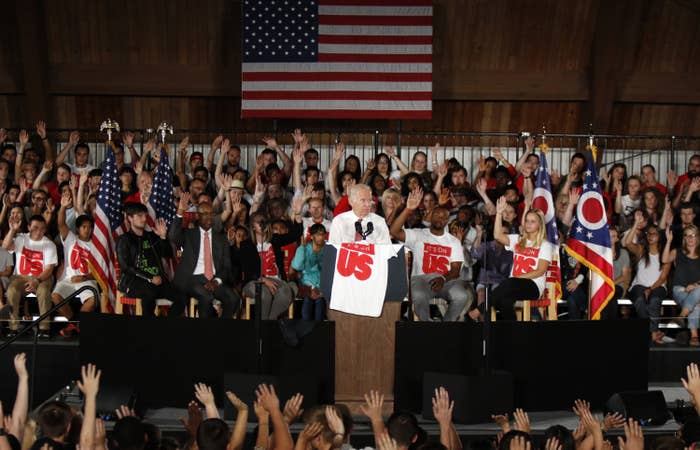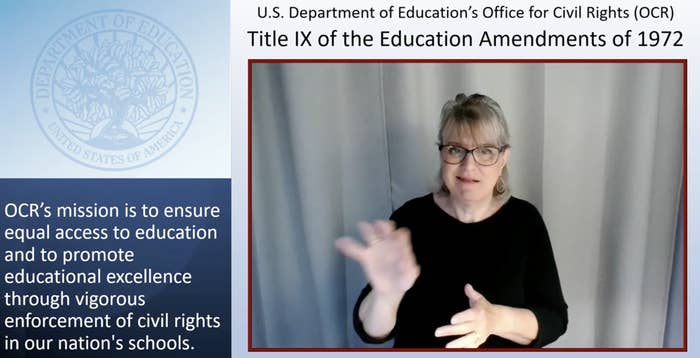
Amelia Roskin-Frazee, a survivor of campus sexual assault, signed up for email alerts the second in April when she heard that the Department of Education, under President Joe Biden, would hold public hearings about Title IX legislation, and she quickly grabbed one of the 600 speaking spots.
Roskin-Frazee, 24, has spoken publicly about her own experience of being raped twice as an undergraduate student at Columbia University in 2015, but she was desperate for a chance to tell the government about how upset she was by her college administration’s handling of the Title IX investigation.
“You never get to give a victim impact statement when your campus harms you,” she told BuzzFeed News. “I really emotionally need to do this for closure.”
Roskin-Frazee was one of dozens and dozens of people who have spoken so far in the public hearings being conducted this week by the Department of Education’s Office for Civil Rights.
So far, a wide range of voices have given testimony: survivors of campus sexual assault who are frustrated at the confusing process, lawyers who’ve represented survivors and those accused, the mother of a survivor, a father whose son was accused of sexual assault, advocates of various organizations tied to sexual assault and LGBTQ rights, a father of a trans child, a parent annoyed that their daughter lost a track event to a trans girl, men accused of campus sexual assault violations, Title IX coordinators, and college administrators.
The public hearings into Title IX regulations are part of the Biden administration’s review of regulations introduced by former education secretary Betsy DeVos in 2020. The new president is seeking to figure out which Trump-era regulations to adjust, scrap or keep.

The hearings, conducted virtually over Microsoft Teams, a video conference application, haven’t been seamless. A Department of Education spokesperson confirmed that people have not been turning up for their specified time slot to speak. With 600 speaking spots — and people on waiting lists — there was an expectation that 120 people would appear each day this week. But by the end of day two on Tuesday, only 128 people in total had given testimony. Technical issues and periods of silence are constant.
Fighting against campus sexual assault has been one of Biden’s cornerstone issues for over a decade; he famously teamed up with Lady Gaga for a public campaign, and the pair appeared at the 2016 Oscars to spotlight the issue. This week’s hearing sessions are the first step in implementing Title IX legislation changes in the Biden era.
“The comments from the public provide a vitally important opportunity for everyone at the Department to listen and learn from individuals and schools who have direct experience with implementing Title IX regulations or have been part of a Title IX process,” a Department of Education spokesperson told BuzzFeed News.
There’s precedent for this strategy. The department held listening sessions in 2010 and 2011 during the Obama administration. As a result, in 2011, the department introduced guidelines for how schools must respond to a report of sexual assault, known as the “Dear Colleague” letter, which was widely celebrated by victims’ advocates. Biden introduced the letter himself. The regulations lowered the evidentiary bar needed to prove a Title IX violation, moving it from “clear and convincing” to “more likely than not.”
When DeVos introduced new federal regulations last May, they were trumpeted as a plan “to restore due process.” The Trump administration tightened the definition of harassment and made it harder for a complaint to be found valid. Those accused of sexual misconduct received greater protections, which many saw as legislation that favors men. People accused of a Title IX violation can now cross-examine their alleged victim, through a third party, during live hearings.

While he was running for president, Biden promised to scrap the Trump administration’s regulations as soon as they were announced, but this will take months, if not years. Still, this week’s public hearings marked the beginning of that process.
“In my work, I’ve seen firsthand how the 2020 Title IX regulations harm survivors and make it more difficult to both come forward to seek help and access their education,” Christina Zuba, an attorney from the Chicago Alliance Against Sexual Exploitation, which represents student survivors, said during the hearing. “The department should revise its definition of sexual harassment to include unwelcome sexual conduct as the 2020 definition unjustifiably requires schools to limit which victims of sexual harm can be provided with assistance under Title IX.”
Others begged for parts of the regulations to remain, such as the increased number of people involved in an investigation, and a few called for the DeVos regulations to not be touched.
“I urge the Department of Education to leave the DeVos reforms on the books,” Nicholas Wolfinger, a tenured professor at the University of Utah, said at the hearing. He decried the “Dear Colleague” letter as enabling a “witch hunt” and spoke about his frustration with facing a Title IX hearing in 2016 after he’d made comments to colleagues years earlier because of the lower burden of proof required for a violation under the Obama administration.
At the hearings, speakers are identified either by their first name and last initial or as “commenter” with a random three-digit number at the end. Some identified themselves publicly and spoke about their own specific traumatic experiences; others gave testimony about how Title IX investigations affected colleagues or loved ones and what changes they wanted to see made.
“The Title IX investigation process was one of the most traumatic experiences of my life. It should not have to be that way,” began the testimony of Lauren, a sexual assault survivor, on Thursday.
Lauren called for investigators of Title IX incidents to receive specific trauma training. She said she didn’t know to ask for her interview to be recorded, that she was misquoted, and that she had misunderstood the definitions of certain words, such as “incapacitated.”
“I felt stupid and wrong because I didn’t understand what I could and could not say in my investigation,” she said at the hearing.
A man named Derick spoke in support of the DeVos regulation because of “the importance to male students of the prohibitions against sex bias and sex stereotypes.” He said that before those regulations were in place, he had been groped at a college event but had been discouraged from reporting because “as a male student I wouldn’t be taken seriously.”
Others also gave testimony about their frustration with the limited definition of sexual harassment under the DeVos regulations and the shift by DeVos to only allow Title IX violations for events that occur on campus. School administrators spoke about how they needed more funding to train staff on the law’s intricacies.
Sarah Clegg, the Title IX officer at Sonoma State University, said the new cross-examination rules — which allow the accused to ask questions of the alleged victim during a live hearing through a representative, such as a lawyer — have had a “chilling effect” on survivors.
“The decision to allow cross-examination by non-neutral advisors is a change that deters reporting, legalizes proceedings, and undermines equal representation,” Clegg said. “It takes us further away from our goal of an educational practice and moves us into a courtroom-like setting on our campuses.”
This week’s hearings are focusing on receiving comments about how colleges can best handle sexual assault cases as well as “addressing discrimination based on sexual orientation or gender identity in educational environments.” As a result, many speakers have discussed trans issues, including the exclusion of trans athletes in college sports.
Despite her excitement about being finally able to speak about her experience at Columbia, Roskin-Frazee was muted less than a minute into her speech after she addressed the deputy assistant secretary for strategic operations and outreach at the Office for Civil Rights, the department overseeing these hearings.
That role is held by Suzanne Goldberg, who previously worked at Columbia University, where she spent seven years as a special adviser to the university president on sexual assault prevention.
One of the rules of the hearings, emailed to speakers beforehand, was that they could not ”reveal personally identifiable information of any person other than yourself, such as full names of private individuals, or personal contact information, or other identifying information for any individual.”
Roskin-Frazee was careful not to name Goldberg, but she believes she was muted because she had mentioned her job title. She tried to unmute herself multiple times but was remuted and then kicked off the call.
A department spokesperson told BuzzFeed News that Roskin-Frazee was muted “due to a technical glitch.” After she contacted the department, they told her via email that her testimony had been “ended inadvertently due to a technical glitch.” The email added, “All speakers, please remember to conform to our housekeeping rules regarding threats and personally identifiable information.”
Roskin-Frazee was subsequently invited back to speak and gave further comments, but told BuzzFeed News she didn't deliver her original testimony as written because she feared being muted again.
“If we can’t mention the job titles of people, administrators at our school,” Roskin-Frazee said, “how are they going to learn anything about anything?”
UPDATE
This story was updated to reflect that Roskin-Frazee was invited back to speak again.

